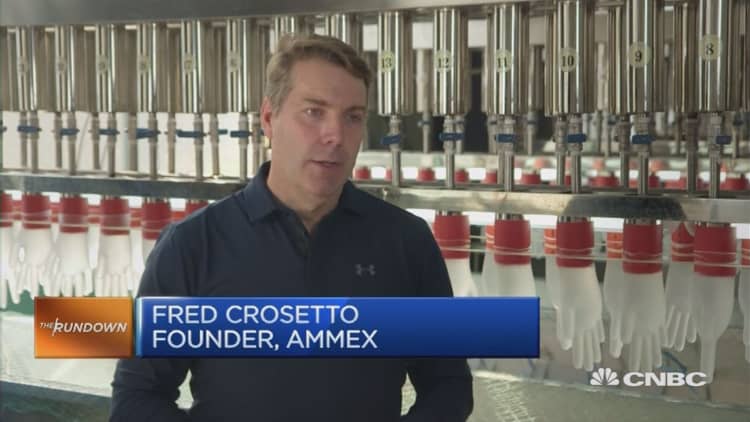
Far from American politics, Seattle native Fred Crosetto has had to upend his Asian investment plans.
A major free trade pact initiated by U.S. President Barack Obama was expected to boost his business selling disposable work gloves for American consumers. However, with the surprise election of Donald Trump, that deal looks all but dead.
"I guess all bets are off until we know what happens with the TPP," Crosetto, founder of AMMEX Corporation, said at a supplier's factory in Yancheng, China.
The TPP, or Trans-Pacific Partnership, encompasses 12 nations as far flung as New Zealand and Peru. The trade pact is a centrepiece of the Obama administration's "pivot" towards Asia and is meant to solidify the U.S.'s presence in what is considered by many American companies as the most economically dynamic part in the world.
However, Donald Trump's victory now leaves the fate of the TPP up in the air. The Republican routinely maligned the deal on the campaign trail. "We will also immediately stop the job-killing Trans-Pacific Partnership," he said to a crowd of cheering supporters at a rally in early November, "That's going to be the next disaster."
Before Trump's victory, Obama was expected to push for the passage of the TPP during the lame duck session in Congress and reassure leaders of TPP member nations attending the APEC Summit in Peru this weekend that the agreement would become a reality.
Instead, leaders of other TPP member nations such as Japan are now planning to take on that role.
Japan's Prime Minister Shinzo Abe met with President-elect Trump in New York en route to the APEC meeting.
In an interview with CNBC, Yasuhisa Kawamura, Foreign Press Secretary at Japan's Ministry of Foreign Affairs, who is traveling with the Prime Minister, described the conversation between the two men as "cordial, off-the-cuff, and frank" and a "good start to mutual trust." He said Abe presented Trump with a Japanese golf driver as a gift and received Trump golf clothing in return.
As for the TPP, Kawamura said: "Japan wants to take the lead and encourage other like-minded TPP countries to fulfill their commitments." He said Abe would continue those efforts at APEC. "The TPP is not just a technical trade agreement," Kawamura said, referring to the agreement's stricter standards including on labor practices and environmental protection for global trade. "Countries should stand by the same values of freedom, democracy, human rights, and rule of law."
Crosetto, who has his gloves made in five countries, said there are negative consequences to killing off the TPP.
He believes, contrary to what many critics of the deal say, TPP would be great for America -- cutting prices for consumers and tariffs for U.S. companies in Asia and back home.
"There are 18,000 products that will come out of the United States into TPP countries and those are going to be more or less duty-free," he said.
"It's an enormous golden age of opportunity for American manufacturers and American suppliers to ship things to Asia because Asians have rising incomes. They want to spend. They have a high appetite for high quality products."
He said the TPP would also create American jobs. He expected to hire more people in the U.S., anticipating bigger sales because of the TPP.
"We think the TPP, in our particular company, [would] generate numerous high paying jobs mostly in services -- social media, design, sales, and marketing," Crosetto explained.
Crosetto had planned to scale back his production in China, which isn't part of the TPP, in favor of Malaysia and Vietnam, which are.
Beijing has long been a critic of the TPP, which would likely create more competition for its own manufacturers with lower-cost countries in Southeast Asia. It has announced plans to seek support for free trade deals at APEC outside of the TPP.
Crosetto is concerned if the TPP – or some form of it – doesn't eventually pass, the consequences will go beyond economics.
"It's definitely is going to be a negative policy decision," he said. "It's going to reaffirm to potentially a lot of countries in the region, or a lot of people who look towards the United States, that maybe the United States isn't committed to Asia long term."
His message for Donald Trump?
"I would say, look, Asia is a very important place," he said. "The United States really would be wise to sit down and think how can we actively engage Asia, China, because this is where things are going to happen in the next 50 years."


